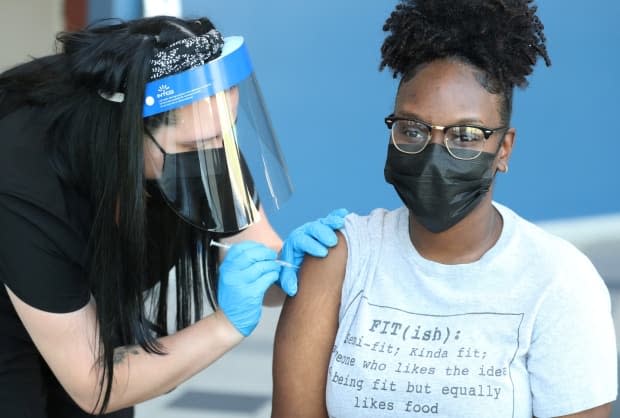Alberta isn't providing 3rd doses to travellers whose COVID vaccination status isn't recognized

Alberta will not be following in the footsteps of Quebec by offering a third COVID-19 vaccine dose to people who want to travel to countries that don't recognize their vaccination status.
On Monday, Quebec's health department said it would make a third dose of either Pfizer-BioNTech or Moderna available for those planning to travel out of the country.
That's because some countries may not consider people who have received the AstraZeneca or Covishield vaccine, or those who have received different vaccines for their first and second doses, to be vaccinated.
Some countries are beginning to implement vaccine requirements for entry and not all nations regulators have approved the same vaccines or standards for vaccinations.
Tom McMillan, a spokesperson for Alberta Health, said in a statement last week that the province isn't currently offering third doses to people who the province considers fully vaccinated but who are looking to travel.
"We are prioritizing vaccines for those who are not yet fully vaccinated. With a global shortage, it would not be appropriate to offer additional vaccines to fully immunized individuals looking to vacation while so many others still await even a first dose," he said.
"Any Albertans who received two doses of AstraZeneca, or a dose of AstraZeneca followed by an mRNA vaccine, can trust that they have received strong protection against COVID-19, both for preventing infection and severe outcomes."
McMillan pointed out that there are currently no immunization restrictions for visitors to the U.S., and that restrictions within the country pertain to private sector events — like cruise line travel or concerts — and are not an official position of the U.S. government.
He said Alberta's health officials are in contact with the federal government, which he said has been advocating on the issue of vaccines.
Boosters currently not recommended
The World Health Organization has said countries looking to roll out booster shots should consider that taking the lion's share of vaccines may be considered "morally indefensible" when many in the world have not yet been able to access a first dose.
Currently in Canada, recommendations from the country's National Advisory Committee on Immunization state there is "currently no evidence on the need for booster doses of COVID-19 vaccine after the vaccine series is complete."
However, it's not yet known how long antibody protection lasts in various populations, such as among immunocompromised people.
As of Tuesday, 64.2 per cent of Alberta's total population (or 75.5 per cent of those ages 12 and up) had received at least one dose, and 54.3 per cent of all Albertans had received both doses.

